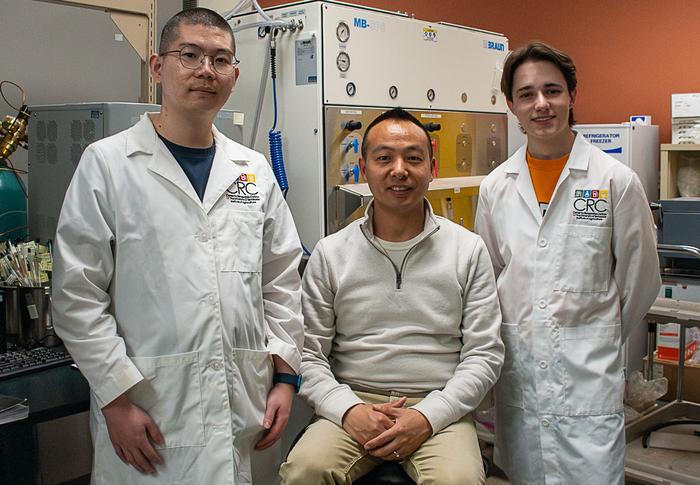Mi Li, assistant professor in the University of Tennessee Center for Renewable Carbon and the UT School of Natural Resources, received a $75,000 research grant from the U.S. Environmental Protection Agency (EPA) for a two-year project using a cellulose-functionalized adsorbent to remove per- and polyfluoroalkyl substances (PFAS) from water. Li has built a student team to work on this project including Kailong Zhang, a Ph.D. student in the School of Natural Resources, and Ryan Baskette, an undergraduate student in the Department of Biochemistry and Cellular and Molecular Biology.

Credit: Photo courtesy UTIA.
Mi Li, assistant professor in the University of Tennessee Center for Renewable Carbon and the UT School of Natural Resources, received a $75,000 research grant from the U.S. Environmental Protection Agency (EPA) for a two-year project using a cellulose-functionalized adsorbent to remove per- and polyfluoroalkyl substances (PFAS) from water. Li has built a student team to work on this project including Kailong Zhang, a Ph.D. student in the School of Natural Resources, and Ryan Baskette, an undergraduate student in the Department of Biochemistry and Cellular and Molecular Biology.
The grant comes from the EPA’s People, Prosperity, and the Planet Program, which provided almost $1.2 million to 16 college student teams across the U.S. to develop solutions for environmental and public health challenges. The team plans to create a cellulose-metal organic frameworks (Cello-MOFs) hybrid adsorbent to remove PFAS from water. PFAS are synthetic chemicals that resist heat, oil, stains, grease, and water. “They’re forever chemicals. They’re applied almost everywhere from firefighting foams to nonstick cooking utensils to textiles and cosmetics. After leaching, they accumulate in the soil, water, and environment, and they’ve been there for a long time, harming the environment, wildlife, and humans,” Li said.
The team will demonstrate how their judiciously designed adsorbent cleans water contaminated with PFAS at the EPA’s National Student Design Expo in 2025. “Our team aims to functionalize naturally derived cellulose with MOFs to capture these substances and contribute to a cleaner and safer environment,” Li said.
Li said the showing at the expo could lead to additional funding for the project or its commercialization. The team also plans to put the project’s results in a technical manuscript for a peer-reviewed journal. Li added, “Having one or two co-authored, peer-reviewed journal publications will benefit the students when applying for graduate school or jobs. It is a big deal!”
“I am thrilled to be a part of the U.S. EPA P3 project as a graduate student team member. This project offers more than just an opportunity for my academic research exploration. It is a valuable hands-on learning experience crucial for my future academic pursuits,” Zhang said.
“As an undergraduate, the lab skills and research experience I have gained as part of this team will be invaluable to my future endeavors. Working on sustainable solutions to environmental and health issues, like PFAS pollution, has been fulfilling and impactful,” Baskette said.
The project will continue through December 2025.
The UT School of Natural Resources is part of the Herbert College of Agriculture, UT AgResearch and UT Extension at the University of Tennessee Institute of Agriculture. The curricula focus on a mastery learning approach, emphasizing practical, hands-on experiences. The School’s faculty, staff and students conduct research and extension that advances the science and sustainable management of our natural resources. For more information, visit naturalresources.tennessee.edu.
Through its mission of research, teaching and extension, the University of Tennessee Institute of Agriculture touches lives and provides Real. Life. Solutions. utia.tennessee.edu



